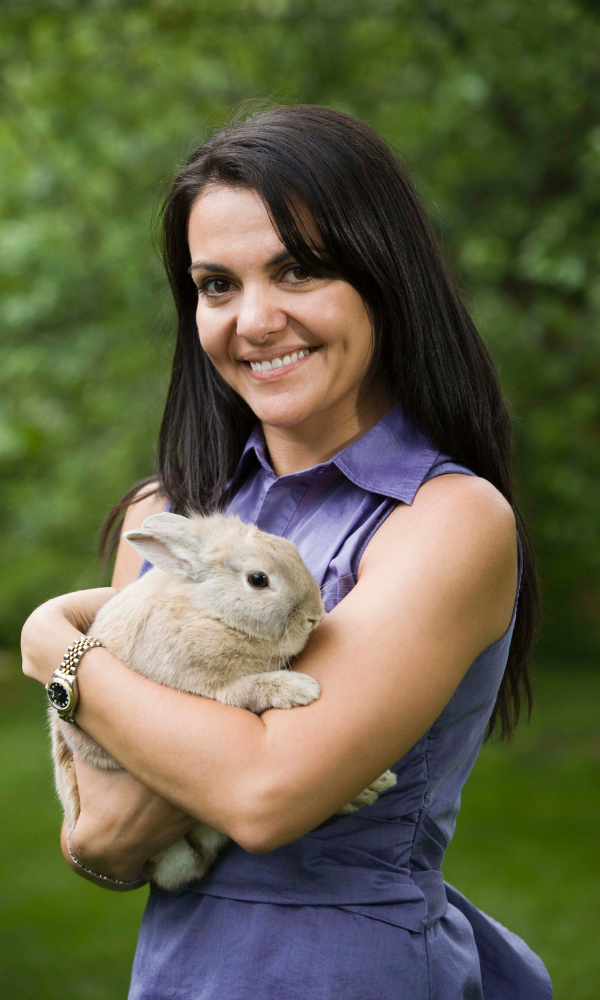Rabbits are popular pets, but it’s important to remember that they’re not like cats or dogs. Are you a new bunny parent, or thinking about becoming one? You may be wondering what the best diet for rabbits is and the best foods to feed them.
There are many different foods that you can give your bunny, but not all of them are good for them. In this article, we will discuss the best and worst foods for pet rabbits and how to feed them the healthiest, most nutritious diet possible. We will also provide a list of recommended food items for your gorgeous furry friend.
So What Do Rabbits Eat?

Rabbits are lagomorphs who consume a herbivorous diet. Wild rabbits eat a broad array of plant materials including fresh and dry grasses, flowers, fruits, seeds, tender twigs, and sometimes small quantities of tree bark. The best diet for a pet rabbit should try to replicate this somewhat and should consist of good quality hay as the predominant bulk of the diet, some leafy vegetables, and sometimes small amounts of pellets and fruit. A rabbit’s diet should try to replicate as much as it can from its wild ancestors as the domestic rabbit’s digestive system is still the same as its wild counterparts.
Grasses And Hay
Hay or fresh grass should make up the majority of your bunny’s diet at 80-90% of their daily calories. In the wild they will graze for 6-8 hours per day and their whole digestive tract is geared towards this level of munching. This will help keep their digestive system healthy and prevent health problems such as overgrown teeth since they continuously need to be worn down.

- Keep the hay or grass coming! Make sure to give them a constant supply of fresh grass hay if they are not out grazing
- Make sure to give them hay that is pesticide and herbicide-free. Some good types of hay to give your bunny include:
- Timothy Hay
- Alfalfa Hay
- Oat Hay
- Ryegrass Hay
- Note: Lucerne and clover hays are too high in protein and calcium for diets and can lead to issues such as bladder stones.
- Hay should make up 80% of their diet as the minimum.
- Store hay in a cool, dry place and discard any hay that is moldy or wet.
- If your bunny is grazing on your lawn – it is imperative you are not treating your lawn with pesticides or chemicals.
Fresh Vegetables
Leafy greens should make up the next percentage of your bunny’s diet. These fresh foods form an important part of their diet as they are a great source of vitamins and minerals that are essential for good health.
Make sure you only give them vegetables in moderation though – too much can lead to diarrhea and gastrointestinal issues such as bloating or gas.

- Aim for 1 packed cup (measuring cups) per lb of body weight per day
- Aim for 3-4 different vegetables per day
So what can rabbits eat daily? Some good vegetables and fresh greens to give your bunny include:
- Broccoli (leaves and stems only)
- Celery and celery leaves
- Beet greens or carrot tops
- Romaine Lettuce or other dark leafy lettuce
- Brussel sprouts
- Kale
- Arugula
- Mustard leaves
- Endive
- Escarole
- Watercress
- radishes including leaves
- Bok Choy
- Cauliflower (leaves and stems)
- Zucchini (skin ok)
- Swiss chard (only small amounts as it is high in oxalic acid)
- Herbs: parsley, dandelion, coriander, basil, dill, mint, thyme
Pellets
Pellets were originally made for rabbits bred for meat and fur production to promote fast growth- not for pet bunnies. Your bunny should only have pellets sparingly if at all. – this is because they are high in protein, carbohydrates, and some other vitamins that may cause issues with their digestive system. Pellets can also lead to obesity if your pet eats too much of them since it is a very concentrated source of food energy!
- Rabbits should NOT be fed solely on ‘pellets’ or ‘mixes’. Many commercial rabbit pellets do not meet the nutritional needs of pet rabbits. If pellets are offered, consider them as treats (see below).
- They should only be offered in treat quantities of two tablespoons 2-3 times per week.
- If you are wanting to feed pellets as part of the diet, I would recommend Oxbow Essentials rabbit pellets at no more than 1/4 cup per 5 lbs per day
- Avoid rabbit pellets that include dried fruit, seeds, nuts, or colorful flecks; these can cause significant digestive issues.
- A high-quality rabbit pellet should have at least 18 percent crude fiber, 12-16% protein, 1-4% fat, and 0.6-1 % calcium.

What Treats Can You Give Your Rabbit?
If you do want to give your rabbit a treat, make sure it is in moderation at around 2 tablespoons – only 2-3 times per week so they don’t become reliant on treats instead of their regular diet.
Some good options include:
- Root vegetables such as carrots, sweet potatoes, and parsnips can be a special treat as they love them
- Cucumber
- Capsicum or red peppers which are also high in vitamin C
- The fruits listed below make a great healthy treat – especially high fiber fruits such as berries, pears, and apricots
Fruits
Offer your bunny fresh fruits as a treat only and should not be fed as part of their daily diet. Too much fruit can lead to diarrhea and other gastrointestinal issues as well as obesity. Rabbits LOVE fruit and they will eat in preference to their hay and vegies (just like kids with candy)
Some good fruits to give your bunny include:
- Apple (remove seeds and core)
- Banana (peel the banana for your bunny, not the whole thing at once or they will choke on it) – small portions only – no more than 1/4 of a banana as they are very high in sugar
- Blueberries
- Strawberries
- Raspberries
- Blackberries
- Pears
- Peach
- Plum (without the pits)
- Pineapple (remove skin)
- Kiwi
- Papaya
- Mango
- Watermelon
- Honeydew melon
- Cantaloupe
- Apricot
- Nectarine
- Oranges (very small amounts)
What Can’t Rabbits Eat?
There are some things that you should never give your bunny as they can be harmful to their health, can disrupt their Gi tracts or cause diarrhea or illness.
These include:
- Chocolate or other caffeine products. These contain theobromine which is toxic to rabbits and can cause seizures, heart attacks, and even death.
- Grapes – these can cause renal failure in rabbits
- Onions or garlic – these are poisonous to rabbits and can cause liver damage
- Other human foods such as bread, pasta, or rice. These can swell up in your bunny’s stomach leading to blockages
- Beans – any kind dried or fresh can cause blockages and digestive problems
- Beets (the actual beet – the leaves and stems are fine)
- Cabbage can cause painful gas
- Corn can cause blockages
- Potatoes
- Rhubarb is poisonous to rabbits
- Spinach (too high in calcium)
- Grains or grain cereals
- Iceberg lettuce which has little to no nutritional value
How Much Do Rabbits Eat?
To sum up the above the ideal diet for your bunny looks like this:
- Have fresh hay or access to grazing available on a daily basis
- 1 packed cup of fresh veggies per day per lb or rabbit
- Aim for 3-4 varieties of vegetables per day
- If you must feed pellets (for example you are out of hay) aim for 1/4 cup per 5lb per day
- Treats 2-3 times per week, around 2 tablespoons per time

How Many Times A Day Should I Feed My Rabbit?
As said above, always make sure they have plenty of fresh hay and change this daily. I usually recommend splitting the veggie ratio out into morning and afternoon.
Do Rabbits Need Sunlight?
You may think this is a weird one for this topic but rabbits need access to unfiltered, natural sunlight daily so that they can metabolize vitamin D
Do I Need To Give My Rabbit Vitamins?
If you are following the recommendations above your rabbit will be receiving a high fiber, balanced diet and will not need to have any vitamin supplements
Other Important Points
- Try to keep feeds & feeding habits consistent. Any changes and introduction of new foods should be made gradually (over a 2-3 week period) to minimize digestive upsets and the potential for diarrhea
- Other supplements such as salt licks aren’t necessary
- It is a good idea to provide other objects to chew on such as wooden chew blocks, cardboard boxes, etc to help wear down your rabbit’s teeth and reduce boredom. If their hutch is of wooden construction it may be chewed, so beware!
- Always have unlimited access to fresh water. For young and baby rabbits, provide them with ‘sipper’ type water bottles. Adult rabbits are best offered from a water bowl as well as ‘sipper’ water bottles

Some Great Resources For Feeding Your Rabbit
Purdue University Rabbit Care Guide
Summing Up:
Bunnies make great pets and can make a wonderful addition to any household. However, they need care and a proper healthy diet from their pet parents in order for them to live long and healthy lives! So be sure you follow all of the tips when caring for your bunny: Feed fresh hay in large quantities of around 80-90% of their diet; keep feeding habits consistent so as not to disrupt their digestive system; provide chewable objects such as wooden chew blocks, cardboard boxes, etc. and always have plenty of clean water available. If you do this on a regular basis then I am confident that both you and your rabbit will enjoy years together with little stress or trouble!

Dr. Elly Cameron is a veterinarian who has always loved animals. She grew up with cats and rabbits, and knew from a young age that she wanted to help animals in whatever way she could. After completing veterinary school in New Zealand, she and her husband moved to North Carolina in 2009. There, she worked as a small animal veterinarian, seeing cats, dogs, and of course her favorite patients – rabbits! In the last few years, Dr. Cameron has been working as a locum vet while she concentrates on raising her two young daughters. She also started writing this blog to help other rabbit lovers out there.

